DFFE INDABA
Ramaphosa and Creecy defend controversial ‘biodiversity business’ plan
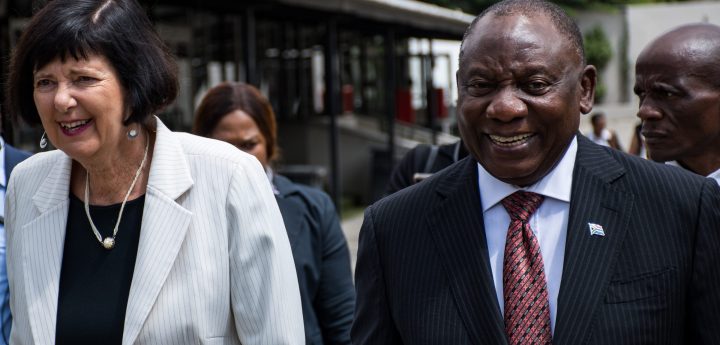
At the Biodiversity Economy and Investment Indaba in Johannesburg this week, Environment Minister Barbara Creecy and President Cyril Ramaphosa highlighted the benefits of their ambitious National Biodiversity Economy Strategy, which has drawn criticism.
‘When one goes to rural areas, you just often get so sad to look at rural areas that you can see are just dormitories where people live, with hardly much economic activity that happens.
“And yet lying hidden, like Rembrandts lying in the attic, are the endowments our people should now utilise – the land, the plants, and everything else that is in our rural communities,” President Cyril Ramaphosa told the Biodiversity Economy and Investment Indaba at the Birchwood Hotel and Conference Centre in Boksburg on Tuesday.
“Those need to be brought to life. That is the residual capital that we have that needs to be utilised.”
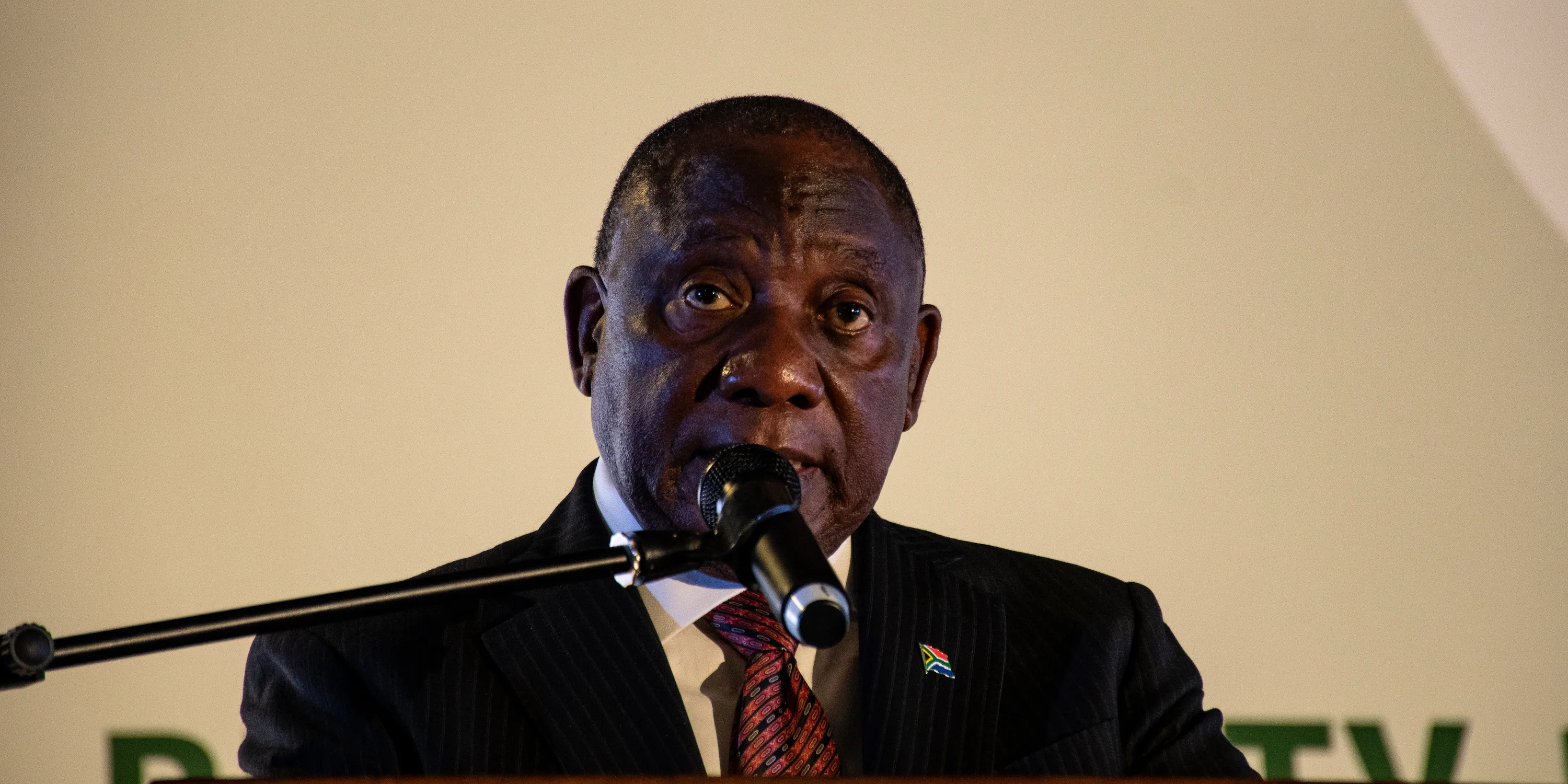
President Cyril Ramaphosa addresses the Biodiversity Economy and Investment Indaba at the Birchwood Hotel and Conference Centre in Boksburg. (Photo: Julia Evans)
The indaba, hosted by the Department of Forestry, Fisheries and the Environment (DFFE), brought together government officials, traditional leaders and healers, academia, business, communities and conservation management authorities to discuss the biodiversity sector’s contribution to the alleviation of poverty, unemployment and inequality, and to pitch biodiversity business concepts to potential investors.
“Over 100 proposals will be pitched to investors,” DFFE Minister Barbara Creecy said at the opening of the three-day indaba on Monday.
“I am hoping that many of these projects will be picked up and come to fruition. I can assure you that the government will support and facilitate their success.”
Central to discussions at the indaba was the controversial draft of the National Biodiversity Economy Strategy (NBES), published for public comment by Creecy earlier this month.
The strategy is aligned with the goals of the White Paper on Conservation and Sustainable Use of South Africa’s Biodiversity and aims to leverage the biodiversity economy to promote conservation, and species and ecosystems management.
Following the release, Don Pinnock wrote in Daily Maverick that while the strategy draft appears to favour the conservation of wildlife and massively extend areas of protection, by embracing consumptive use, the strategy cuts across the advances made by Creecy and her department regarding the welfare of wild animals, her stand against captive-bred lions, the progressive findings of the high-level panel on lions, elephants, rhinos and leopards, and the White Paper on Conservation and Sustainable Use.
Read more in Daily Maverick: Government trying to slam through plan that will result in massive exploitation of wildlife
Pinnock also noted, “The redistribution and protection of reclaimed areas and redistributed land has not fared well in South Africa and often devolves into squabbles between claimants and rural groups. It tends to be insufficiently policed and is often plundered.”
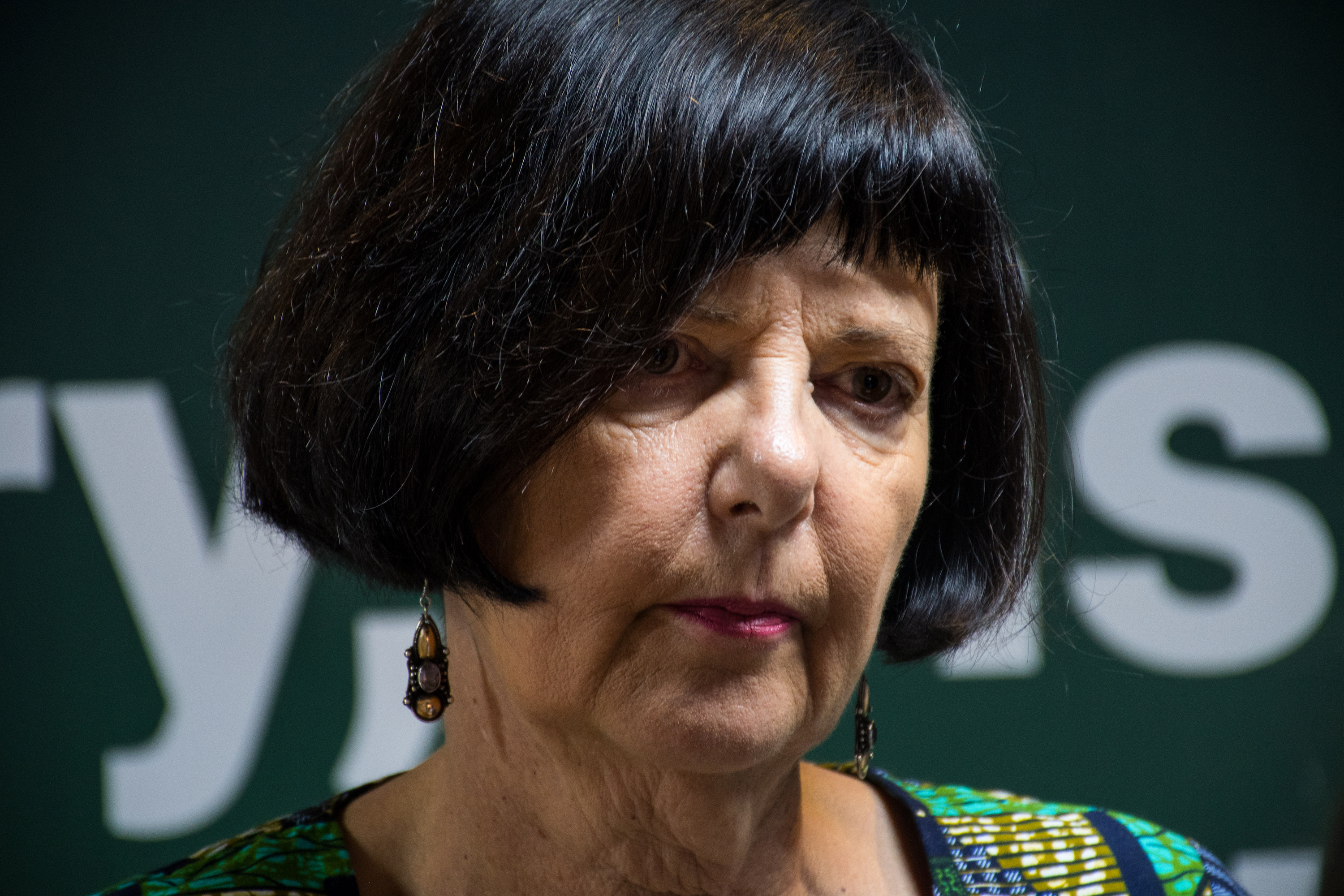
Minister of Forestry, Fisheries and the Environment, Barbara Creecy at the Biodiversity Economy and Investment Indaba. (Photo: Julia Evans)
Creecy told Daily Maverick at the indaba that this perspective was a “misreading” of the strategy.
“The problem is we’ve had two historically diverging schools of thought. The one school has said, ‘In order to have conservation, you look and you don’t touch,’ ” said Creecy. “And the other school of thought has said, ‘There’s biodiversity, let’s utilise it.’ ”
In her keynote address, Creecy noted that the white paper identified the challenge that “inappropriate and illegal practices have on South Africa’s reputation as a world leader in biodiversity conservation.
“As such, the white paper also emphasises the importance of the duty of care, and ensuring the wellbeing of animals and nature more broadly.”
Hunting
Pinnock noted that the plan would “make South Africa one of the world’s top destinations for trophy hunters at a time when that practice is coming under increasing disapproval internationally. This could have a negative impact on brand South Africa and international tourism.”
“Will there be consumptive use in certain situations? Yes,” Creecy told Daily Maverick.
“I mean, hunting is a big industry, and whatever everyone’s subjective views are about hunting, one cannot detract from the fact that hunting contributes an enormous amount of income [to] conservation.”
Creecy said all protected areas cull animals.
“Of course, these are not things that ecotourism ever shares… You don’t come to the Kruger Park to watch the culling of impala, but it happens.
“What we’re saying is, if you were to have extensive herds of game on areas that are currently marginal for conventional agriculture, this land would be compatible with conservation, with ecosystem restoration, and you would be finding a sustainable offtake,” said Creecy.
“So we’re not talking about putting impala in feedlots. We’re talking about extensive systems with commensurate offtake.”
Biotrade and bioprospecting
An exhibition at the indaba showcased market-ready biodiversity products and services from across the biodiversity economy value chains, such as biotrade and bioprospecting — which is the processing of indigenous plants into consumer products.
“The trade in indigenous medicine plants is a multimillion-rand industry that supports jobs and livelihoods across the value chain,” Ramaphosa said during his address.
“As a country, we have been firm that communities must benefit in a tangible manner when plant and animal species are harvested for commercial gain.”
He said that four years ago, the first industry-wide benefits-sharing agreement was launched between the South African rooibos industry and the Khoi and San councils.
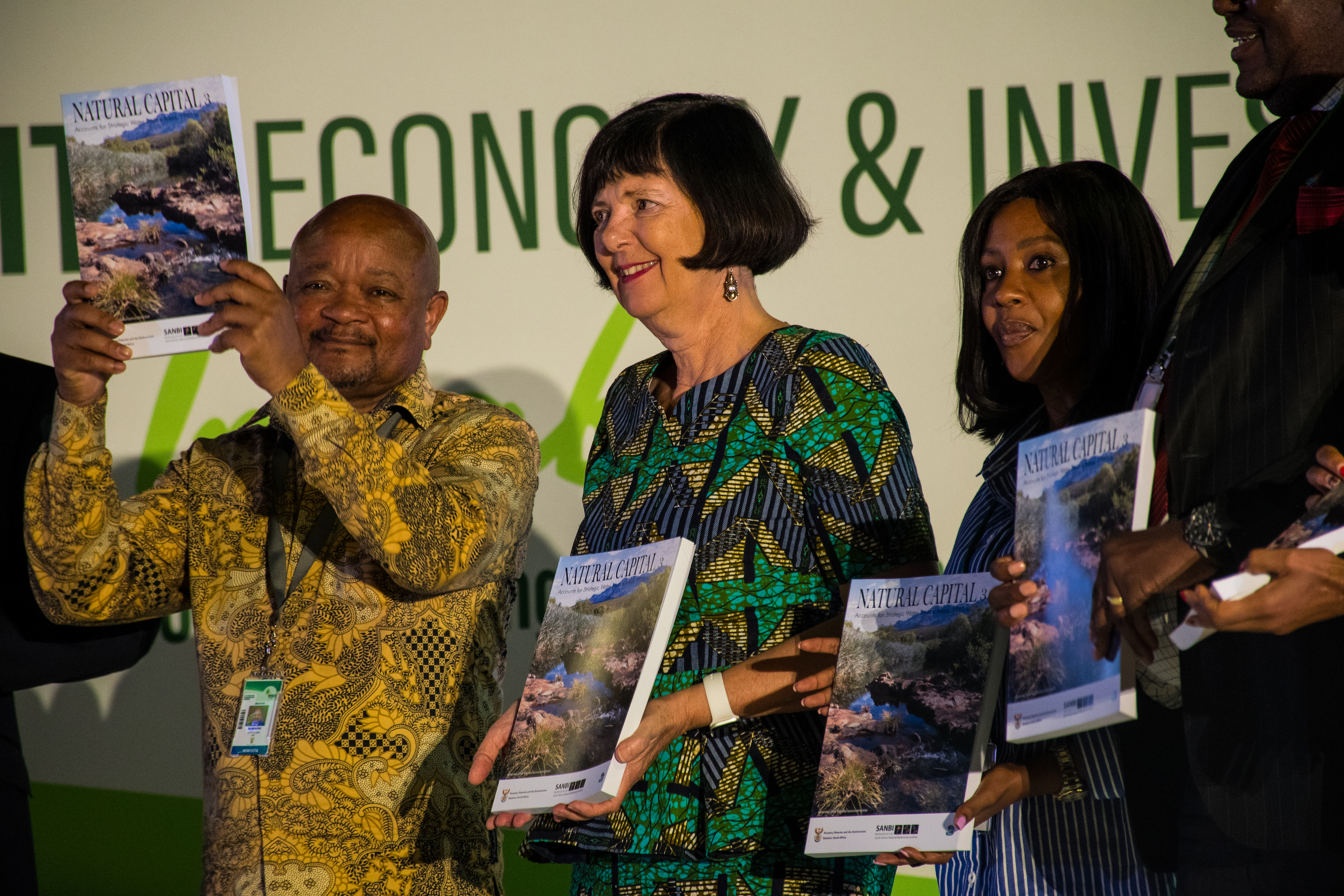
Water and Sanitation Minister Senzo Mchunu (left) with Minister of Forestry, Fisheries and the Environment Barbara Creecy hold the National Capital Accounting books for strategic water sources in SA, prepared by the Statistician General. (Photo: Julia Evans)
This agreement had to date distributed R28-million to the two councils in recognition of the communities’ indigenous knowledge of the rooibos species, Ramaphosa said.
Wolande le Roux, an exhibitor at the indaba selling Sceletia Honeybush Tea, said she was glad Ramaphosa mentioned rooibos in his speech, because in Eastern Cape there was almost no capacity for communities to enter the rooibos and honeybush processing value chain, unlike Western Cape where the provincial government offered support.
Le Roux, who works with communities in Tsitsikamma and Gqeberha and is passionate about indigenous knowledge (being a descendant of the Khoi people), said that in the honeybush market, most local people were harvesters. There were hardly any indigenous people processing the raw honeybush into a commercial product, where most of the money was.
“The support that indigenous communities need, especially Khoi and San people, from the government is to transform from being just a labourer or harvester into getting into the processing value chain,” Le Roux said.
“There are so many byproducts that can come from honeybush,” Le Roux said, from herbal remedies to skincare products.
“But you need to capitalise the local communities — create awareness of the opportunities, then train them and give them the necessary skills and then give them the financial or technical support.”
An indigenous company that has received harvesting training from the DFFE is Mazoyi Group, in Alice, Eastern Cape. It processes indigenous aloe and Pelargonium plants into a range of medicines.
Its CEO and founder, Lwazi Marawu, who commercialised the indigenous healing practice that his great-grandmother started in her community in 1906, acknowledged that while the DFFE’s training on harvesting was good, they needed more training on the business side.
Ramaphosa said in his address that approximately R2-million had been paid to traditional authorities in the Eastern Cape, Northern Cape, North West, KwaZulu-Natal and Limpopo in recognition of indigenous knowledge associated with plants like aloe, Sceletium, marula, Pelargonium and buchu.
“We know that compensation in recognition of indigenous knowledge held by communities is not enough,” said Ramaphosa. “We know that payment to communities for harvesting these species is also not enough.
“There must be tangible beneficiation in communities when indigenous plant species are harvested for commercial benefit.”
“It’s a very grand plan… I can see how it’s contributing to the economy and commercialisation, but I’m not seeing how it contributes toward conservation,” Le Roux said.
Land use in rural communities
“It cannot be business as usual,” said Creecy, speaking of the need to include rural communities and previously disadvantaged individuals in the biodiversity economy.
That would require investment into community-owned land for conservation-compatible land use with biodiversity enterprises.
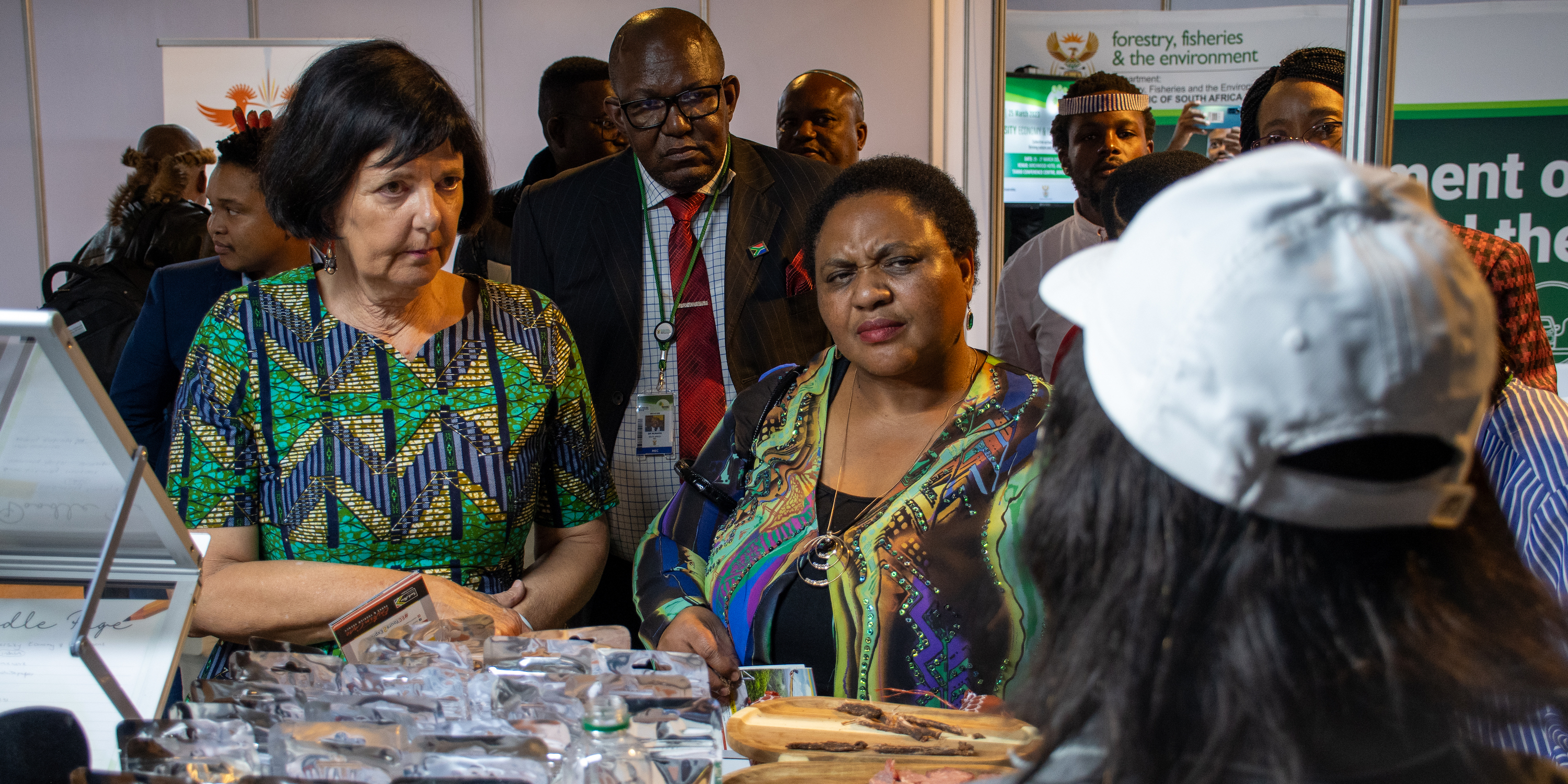
Forestry Fisheries and Environment Minister Barbara Creecy (left) and Agriculture, Land Reform and Rural Development Minister Thoko Didiza listen to a vendor at the biodiversity economy exhibition. (Photo: Julia Evans)
Agriculture, Land Reform and Rural Development Minister Thoko Didiza noted in her address at the indaba on Monday that land-use changes were not optimally managed in rural areas, and could create conflicts between the environment, culture and development.
“As the population grows, so does the need for alternative land use for housing, agriculture and other developments,” Didiza said. “This is the reality and the balancing act that we must always uphold.”
Assisting communities with land for development, in tandem with protecting nature and wildlife, would make communities value nature and actively engage in the protection of biodiversity, Didiza said.
International standards
South Africa adopted the Kunming-Montreal Global Biodiversity Framework, at the last UN Biodiversity Conference in 2022.
The headline target is the “30×30”, which aims to effectively conserve at least 30% of the world’s land, freshwater and oceans by 2030, while also respecting the rights and contributions of indigenous peoples and local communities.
Creecy said SA needed to domesticate the global agreement, and the white paper was a mechanism for doing so, as was the revised National Biodiversity Economy Strategy. She said the strategy was in line with international policy and thought.
“If we’re going to get anywhere near 30% of the land target, we are going to have to deeply interrogate a question of sustainable use,” Creecy said.
“What we know is, that at the moment, conservation is either done by government or by private landowners, the majority of whom [are] historically privileged South Africans.
“We think that there is significant land in our country that belongs to traditional authority, and to community property associations that can enjoy some form of protection and ecosystem restoration, and still have a sustainable offtake that could benefit those communities.”
Creecy said that to achieve the 30×30 target, the state would need the help of the private sector. DM




















 Become an Insider
Become an Insider
This will not be monitored/ policed properly & corruption will run riot in this under regulated industry
The devil will be in the details and dogmatic politics can spoil the best of plans. Other than that, one of the first good ideas to come out of the ANC in quite some time. We need to use (and protect) our competitive advantage and in our case it is abundant nature.
When it’s too late to save South Africa’s fauna and flora, Barbara Creecy won’t be around to see the weeckage she proposed.
If consumptive use isn’t implemented, but controlled, then it IS to late to save anything…
The road to hell is paved with good intentions. There is sense in especially things like allowing commercial agriculture of region-specific plants in protected regions if we then also do extraction and value add rather than ship off a truckload of raw material.
Where most of us get concerned is in how this will eventually play out. By now we assume that there will be corruption. We assume that funding will not be applied as intended. If we’re going to make funding available it should for example be on an underwriting basis. If Joe can convince Bank X to advance R10m for his project, then the state will issue Bank X witha guarantee for half any loss suffered. That way projects undergo independent private sector due diligence. If it is bankable, then sure : reduce the cost of funding with a partial guarantee that keeps the bankers honest.
If a bank won’t go near a project even with half the capital loss underwritten then we should call these things white elephants or flying pigs.
Ramaphosa & Creecy sitting in a tree! C. O. R. R. U. P. T. I. O. N.
Here comes the new piggy bank for the corrupt and elite of the ANC!
Be positive people! This might be a good start to pet all citizens share in the countries wealth. BUT it needs to be well managed and controlled – which are not current (provincial and national) government’s strength…
With adequate OPEN scientific control and respected environmental groups verifying and advising, consumptive management is the only way forward. As an example, many Limpopo provincial reserves have excess animals that are literally dying due to overpopulation and mismanagement. Through scientific consumptive management the animal populations can be kept at optimal reproduction levels, and the excess culled for food and desperately needed conservation funding. Trust, but verify – but DO something!
Assuming the current polls are wrong and the DA continue to manage the Western Cape as well as they do, against many odds, I’d take issue with you as far as they’re concerned!
Presently we are trying to protect rare and endangered plants that are being illegally overharvested by traditional healers. And failing! There are mountains of animal and plant products illegally harvested like pangolin and vultures and Stangeria cycads in Warwick Street Market in Ethekwini. How will this new biodiversity act put an end to that?
Agreed! Transgressors should be prosecuted and the penalties for violations should be much stiffer. But underwriting and supporting legal operations should also be the priority of government – remove some of the red tape and make it easier for especially previously disadvantaged people to legally and sustainably produce and harvest resources and not be forced to use illegal methods.
The biggest obstacle is the “traditional authority” owned land where millions of people have been living historically, but doesn’t own property and cannot get funding or approval to better themselves. The tribal/”community” leaders are reaping all the benefits and people are suffering – just another form of indentured servitude bordering on slavery…
We believe the change is through creating ecological balance and restoration by turning alien and invasive plants into a green charcoal, as Morumotsho (PTY) LTD. Believe it is a great ideal to be recognized on the green value chain business, in the Eastern Cape, Matatiele. Which we are currently clearing alien and invasive black and silver wattle that is responsible for large water consumption and make green charcoal with the cleared biomass.
Email address:[email protected]
Start off with Education and cleaning up our rivers Dr Creecy. There is no substitute for sustainability…and whilst on the subject – Conservancies ( personally financed, organised and sustained) need Government funding and support – it is these community endeavours that struggle to keep our biodiversity initiatives going.
Just look at how corruptly this arrangement worked out in Mpumulanga/Limpopo, with the ANC Premier League crooks stealing the land for themselves from those trying to conserve the land and wild life. The next big ANC cadre steal is loading…
Mo money fo my honey
Where is this to happen? Already happened in wildlife industry on privately owned land over last 40 years . Cannot happen on rural communal land because no land tenure reform. Load of hot air.
Where is this to happen? Already happened in wildlife industry on privately owned land over last 40 years . Cannot happen on rural communal land because no land tenure reform. Load of hot air.